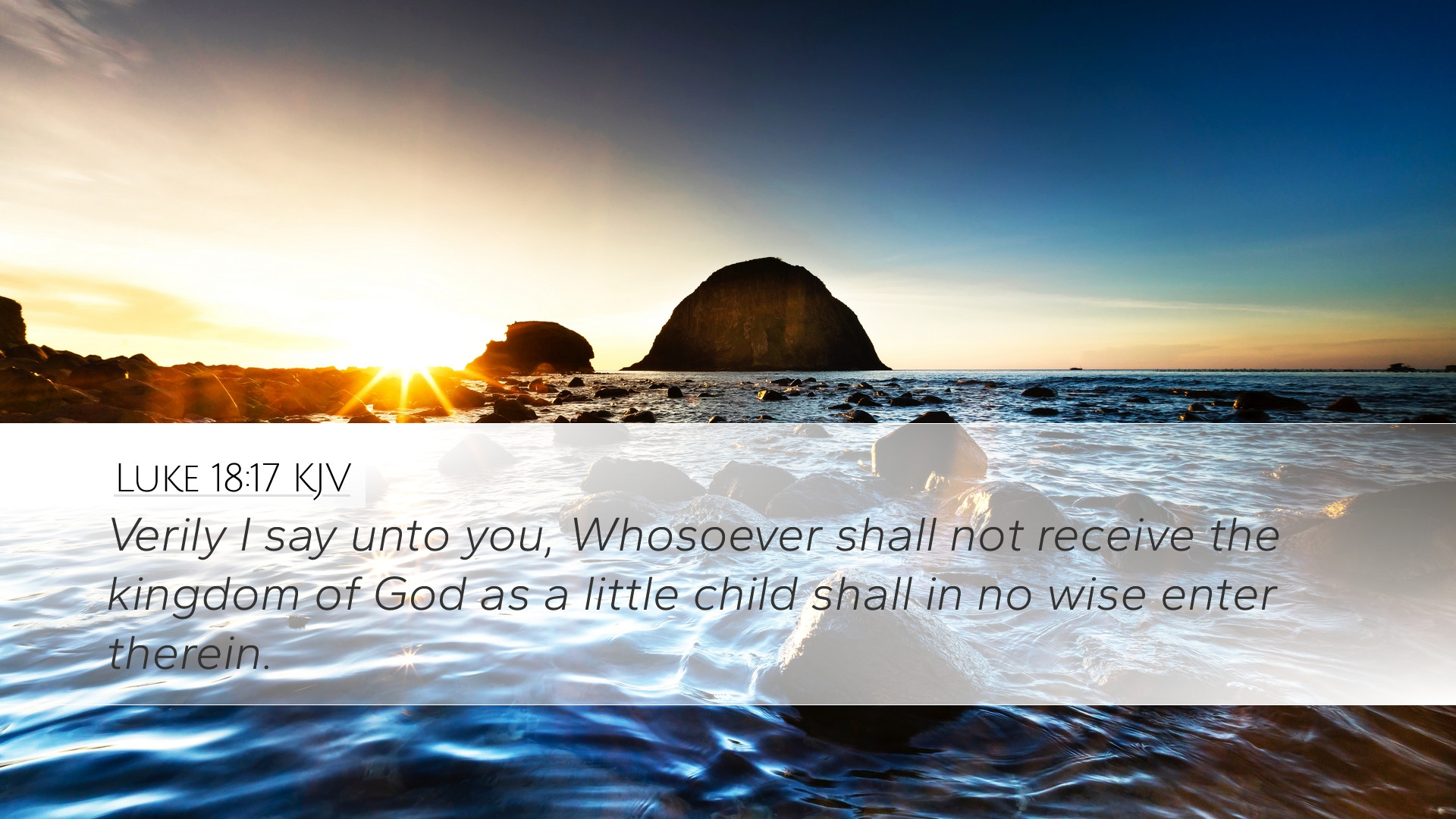Commentary on Luke 18:17
Verse: "Truly I say to you, whoever does not receive the kingdom of God like a child shall not enter it."
Introduction
This profound verse from the Gospel of Luke encapsulates a vital teaching of Jesus regarding the nature of faith and the qualifications for entering the kingdom of God. Within this context, it serves as a reminder of the simplicity, humility, and trust that characterizes a true believer.
Contextual Background
Luke 18:17 occurs within a larger narrative where Jesus addresses various groups, including His disciples and the Pharisees. This passage particularly follows the account of Jesus blessing little children, which emphasizes the importance of approaching God with the same innocence and openness as a child. Understanding this context is crucial for appreciating the depth of His statement.
Insights from Commentaries
Matthew Henry's Commentary
Matthew Henry emphasizes the necessity of humility in receiving the kingdom of God. He asserts that children embody a spirit of dependence and trust that adults often lose. He remarks:
"Little children are not capable of understanding many things, yet they possess an implicit trust that adults should emulate."
He further highlights that the kingdom of God is not for the proud but for the humble, stating that the entrance into this kingdom necessitates a willingness to accept God’s grace without the encumbrances of self-sufficiency.
Albert Barnes' Notes on the Bible
Albert Barnes elaborates on Jesus’ analogy of the child, noting that a child’s qualities are indicative of the attributes required for a believer. He writes:
"Children show complete trust, are free from guile, and are not presumptuous; these are traits that must be mirrored by those who wish to enter the kingdom."
Barnes argues that the design of Christ’s statement is to encourage His followers to relinquish their reliance on intellectualism or accomplishments. He underscores that true faith mirrors the simplicity and openness of a child.
Adam Clarke's Commentary
Adam Clarke adds another dimension by discussing the nature of the kingdom of God itself. He reflects on how it is characterized by grace and acceptance. Clarke argues:
"To enter the kingdom, one must submit themselves without pretense, accepting the terms of admission solely through faith."
In his examination, he also warns against the dangers of adult cynicism and self-reliance, underscoring that these qualities hinder one’s ability to trust in God fully.
Theological Implications
The theological implications of Luke 18:17 are profound. This verse directly challenges the human condition of pride and the inclination to rely on personal merit. It calls for a return to child-like faith, which embodies purity, simplicity, and utter dependence on God’s grace.
- Faith as Simple Trust: Child-like faith is characterized by a straightforward belief in God's goodness and promises.
- Humility in Approach: Rejection of pride is paramount; entering the kingdom demands recognition of one’s human limitations.
- Spiritual Openness: Like a child, believers must be open to learning and receiving guidance from God.
Application for the Church
For pastors, students, and theologians, this passage serves as an exhortation to cultivate a community that values humility and child-like trust in God. Practical applications may include:
- Encouraging Vulnerability: Creating a culture where individuals feel safe to express their spiritual needs and uncertainties.
- Promoting Dependency on God: Teaching the congregation to rely on prayer and divine assistance rather than solely on human effort.
- Modeling Simplicity: Emphasizing the importance of a simple faith that trusts in God’s promises, regardless of life’s complexities.
Conclusion
In conclusion, Luke 18:17 is a powerful reminder of the nature of the kingdom of God and what is expected of its citizens. It calls for a radical rethinking of faith that prioritizes humility, trust, and a child-like demeanor. As followers of Christ, may we continually strive to embody these qualities and encourage others to do the same.


